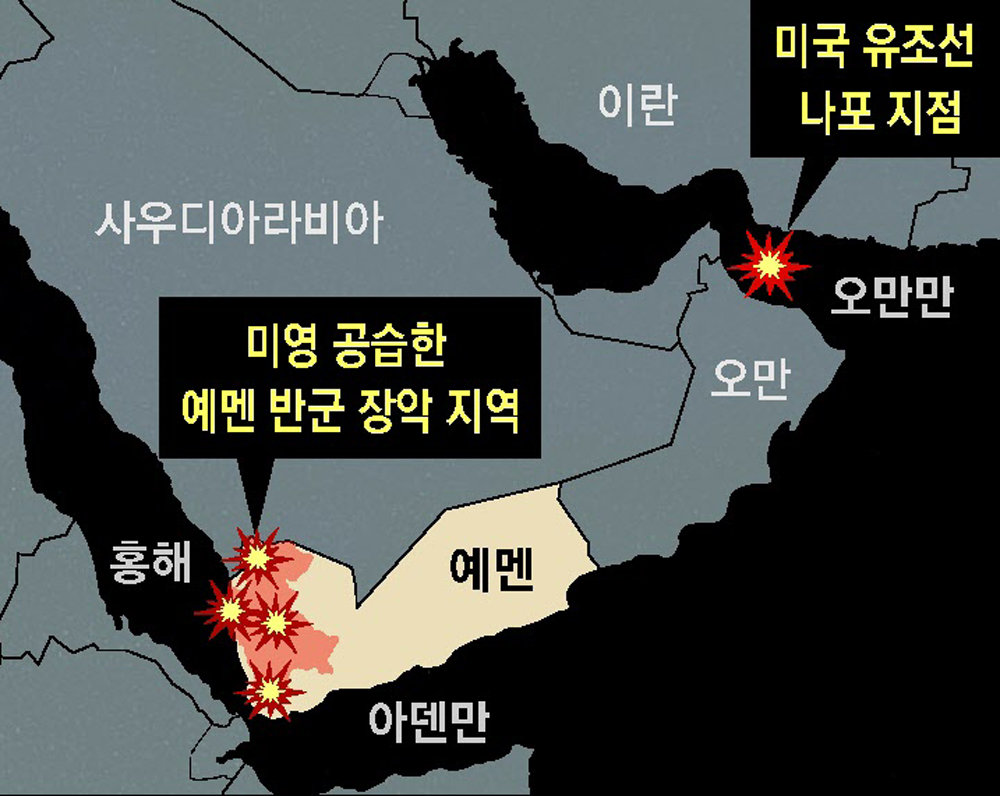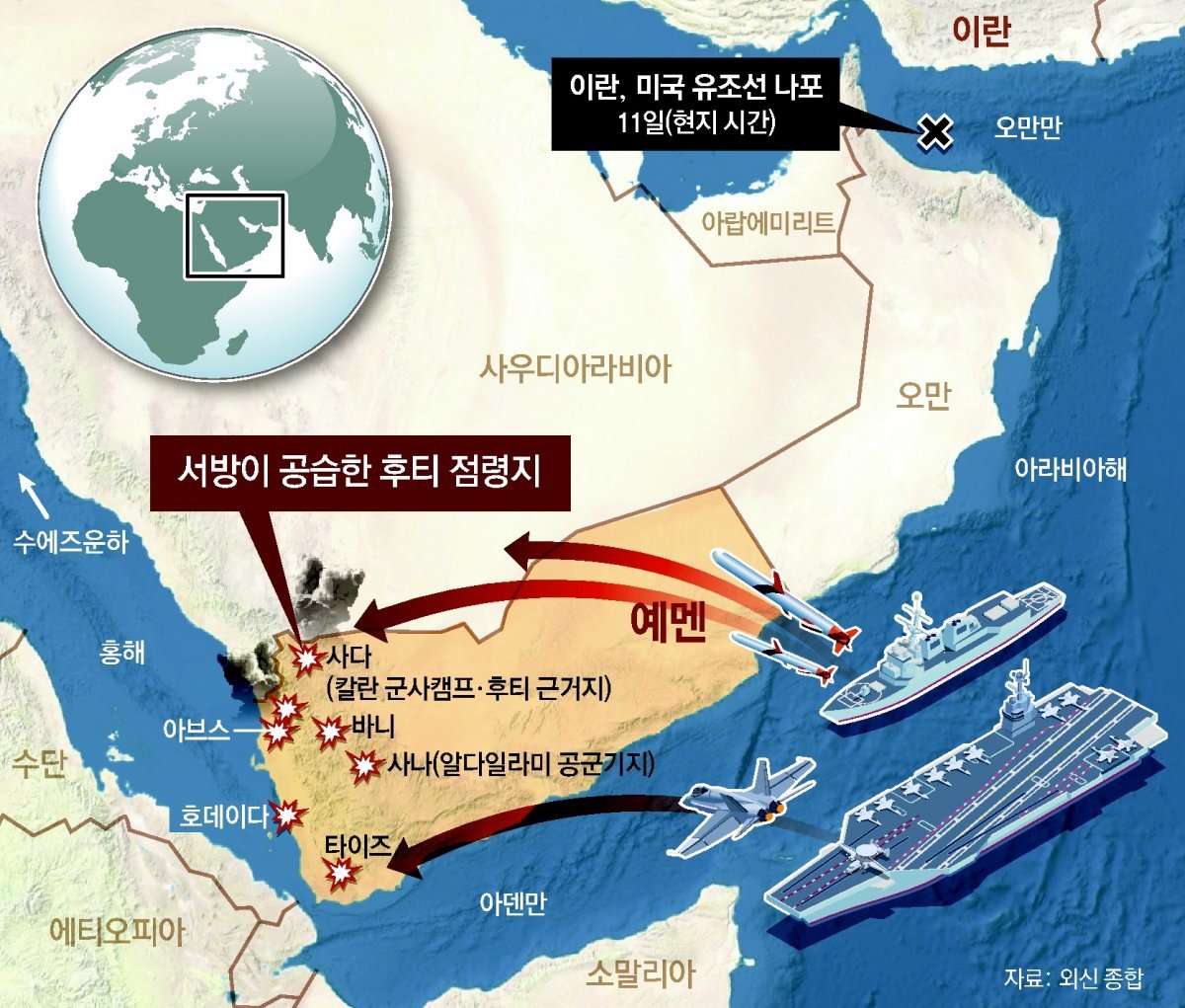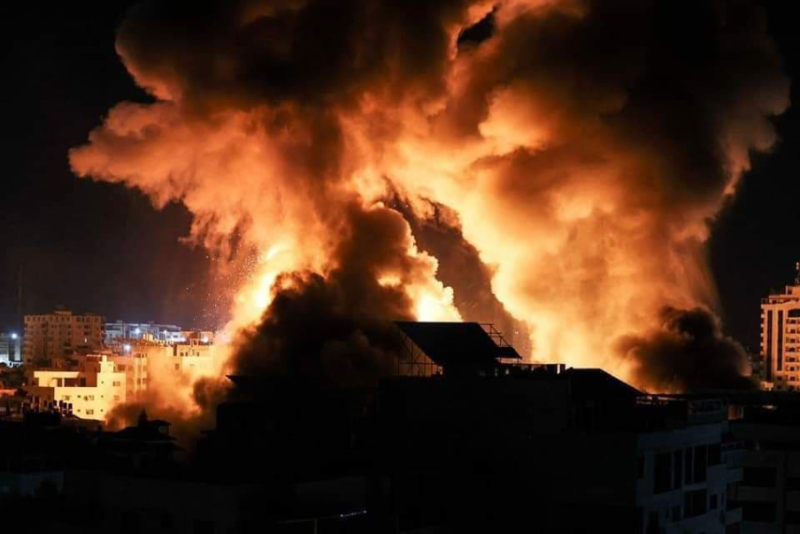Iran conducts airstrikes on 16 Houthi rebel bases… ‘Logistics artery’ blocks attacks on civilian vessels in the Red Sea
Iran’s criticism… Possibility of armed conflict with the United States
One Korean ship in the Red Sea… Government “Safety Inspection”
As oil prices fluctuate, domestic industries also worry about damage.
At 2:30 a.m. on the 11th (local time), the United States and Britain launched a surprise attack on the military facilities of the pro-Iran Yemeni rebels Houthis, who had been attacking the Red Sea, the ‘artery’ of global logistics. This is the first armed airstrike launched by the US-British coalition in the Middle East since the war in the Gaza Strip that broke out in October last year, and there are concerns that it could escalate into an all-out war between the US and Iran.
U.S. President Joe Biden issued a statement on this day and said, “The U.S. and British forces successfully struck multiple Houthi targets in Yemen with support from Australia, Bahrain, Canada, and the Netherlands.” British Prime Minister Rishi Sunak also called the attack a “necessary and proportional measure (to the Houthi attack).”

According to the U.S. Central Command, the U.S.-British coalition mobilized submarines and fighter jets to attack more than 60 targets in 16 Houthi rebel bases. Central Command declared the attack “a multinational strike that strengthens the international community’s commitment to freedom of navigation and counters Houthi attacks on commercial shipping in the Red Sea.”
Governments of eight countries, including Korea, also issued statements of support. Korea, Australia, Bahrain, Canada, Denmark, Germany, the Netherlands, and New Zealand emphasized that this was a protection measure for their ships, saying, “This is in accordance with the right of individual and collective self-defense in accordance with the UN Charter.”
The Houthis, who suffered a surprise attack, told AFP, “At least five people were killed in this airstrike. “The United States and others will pay a price,” he said, adding, “We will not stop attacking Israeli-related ships.” Iran also criticized it as “a clear violation of Yemen’s sovereignty and territorial integrity and a violation of international law.” Russia, which supported Hamas, also requested an emergency meeting of the UN Security Council immediately after the airstrike.
Domestic industries that use the Red Sea as a gateway to the European market will also find it difficult to avoid the blow. Both the home appliance industry, which supplies parts from China and other countries and transports them to European factories, and the automobile, materials, and petrochemical industries that export finished products are all affected. The Suez Canal, which connects the Red Sea and Europe, is responsible for about 10% of the total maritime transportation volume of the domestic home appliance industry. International oil prices are also fluctuating. On the New York Mercantile Exchange, the price of West Texas Intermediate (WTI) crude oil for February delivery was traded at $73.96 per barrel on the 12th, up about 2.7% from the previous day’s closing price. American electric car company Tesla has decided to suspend most car production at its Grünheide plant in Germany until the 11th of next month.
According to the Ministry of Oceans and Fisheries, a 40,000-ton bulk carrier of Korean nationality with a total of 21 people on board, including 4 Koreans, is passing through the West Bank of Yemen, the area of the air raid. As of 9 p.m. on the 12th, no special safety issues have occurred. An official from the Ministry of Oceans and Fisheries said, “We will conduct safety inspections and 24-hour monitoring at the comprehensive situation room.”
Rebels threaten civilian vessels in the Red Sea 27 times… ‘Logistics blockade’ with Iranian support after Gaza war
The United States takes direct military action to intervene in Iran… Rebels: “We will also attack US-British bases”

 Yemeni rebel stronghold burning In the early morning of the 11th (local time), a building is burning due to US and British airstrikes near the capital, Sanaa, one of Yemen’s Houthi rebel strongholds. The U.S.-British coalition struck more than 60 targets in 16 locations, including what was believed to be a Houthi military facility, with Tomahawk missiles. In Yemen, it was reported that explosions were heard in several areas, including Hodeidah Airport. Photo source: Al-Arab News Channel
Yemeni rebel stronghold burning In the early morning of the 11th (local time), a building is burning due to US and British airstrikes near the capital, Sanaa, one of Yemen’s Houthi rebel strongholds. The U.S.-British coalition struck more than 60 targets in 16 locations, including what was believed to be a Houthi military facility, with Tomahawk missiles. In Yemen, it was reported that explosions were heard in several areas, including Hodeidah Airport. Photo source: Al-Arab News Channel The entire Middle East was caught up in a whirlwind as the United States and Britain launched massive shelling on the bases of the Iran-backed Yemeni rebels, the Houthis, in the early morning hours of the 11th (local time). The United States has been hesitant to intervene militarily in the provocations of pro-Iranian forces for fear of a full-scale war expansion, but as the Houthi rebels’ use of force and the blockade of the Red Sea prolonged, the United States eventually launched a counteroffensive.
Since November 19 of last year, Houthi rebels have threatened civilian ships passing through the Red Sea 27 times. The justification is to help Palestine against Israel’s invasion of the Gaza Strip. In order to expand its influence in the region, Iran has been uniting anti-American and anti-Israel forces such as the Houthis, the Palestinian armed political group ‘Hamas’, and the Lebanese armed political group ‘Hezbollah’ under the name of ‘Axis of Resistance’.
The recent incident in which U.S. ships were attacked or captured by the Houthis and Iran was a decisive factor in the U.S. and other countries’ decision to launch airstrikes. As the global logistics burden rapidly increased due to Houthi attacks, the United States established the multinational security initiative ‘Operation Prosperity Guardians’ on December 18 last year and warned of a military response. In fact, the U.S. Navy destroyed three Houthi rebel ships that were attacking civilian merchant ships in the Red Sea late last year.
Iran also immediately responded. On the first day of this year, the destroyer Alborz was dispatched to the Red Sea, and on the 11th, the American oil tanker St. Nicholas was captured in the Strait of Hormuz. As Iran shows off its control over the world’s ‘logistics artery’, the United States cannot stand by and watch. On the first day of the airstrike, the U.S. Air Force Central Command struck 16 Houthi strongholds, including the Yemeni capital Sanaa. This included the Houthis’ command and control facilities, munitions storage, and air defense radar systems.
The attack involved fighter planes, ships, submarines, and Tomahawk cruise missiles. The Tomahawk’s flight speed is relatively slow at 890 km/h, but it is capable of hitting with precision. CNN reported, “The most ‘classic’ military operation of the United States is to use Tomahawk-based airstrikes to create a ‘swampy field’ and then deploy ground forces.” The Tomahawk became famous for destroying major military facilities in Iraq during the 1991 Gulf War, and is also called a ‘signal of US military intervention’ as it always appears in Afghanistan and Syria.
This is the first time that the U.S. military has directly struck Houthi rebels in Yemen since the war between Israel and Hamas began in the Gaza Strip. The New York Times reported, “This is the largest strike since 2016, when the United States fired three Tomahawk missiles at Houthi rebels.”
The Houthis immediately protested. Abdullah Ben Amer, a senior Houthi official, told Al Jazeera: “If the US and UK expand their military activities, we will strike their bases in the region.” Houthi rebel spokesman Muhammad Abdul Salam also said, “We will continue to target ships heading to Israel in the Red Sea and Arabian Sea.” The government of Saudi Arabia, a Sunni suzerain state that has been negotiating peace with the Houthi rebels for the past several months, called for calm in a statement, saying, “We must prevent the situation from worsening.”
There is also an opinion within the United States that the Houthi rebels have increased tensions in the Red Sea so much that a military response was inevitable. The U.S. CNN broadcast analyzed, “As the Joe Biden administration’s ultimatum was ignored, the credibility of America’s power in the Middle East was jeopardized,” and “the need to somehow re-establish deterrence was raised.”
Military conflict in the Red Sea is likely to continue for some time. The think tank ‘Atlantic Council’ predicted in a report immediately after the airstrike that “the airstrikes will not stop just once.” William Usher, a former senior Middle East analyst at the U.S. Central Intelligence Agency (CIA), also told Bloomberg News that “the Houthis are an extremely uncompromising organization in the Middle East,” and “they will not back down easily.”
However, it is still difficult to determine whether this air strike will escalate into an all-out war. It is expected that the Iranian government’s attitude will serve as a decisive variable in the future. Iranian Foreign Ministry spokesman Nasser Qanani responded in a statement that day, saying, “We strongly condemn the US and UK military attacks,” but did not mention a specific response.
Paris =
Cairo =
Source: Donga
Mark Jones is a world traveler and journalist for News Rebeat. With a curious mind and a love of adventure, Mark brings a unique perspective to the latest global events and provides in-depth and thought-provoking coverage of the world at large.